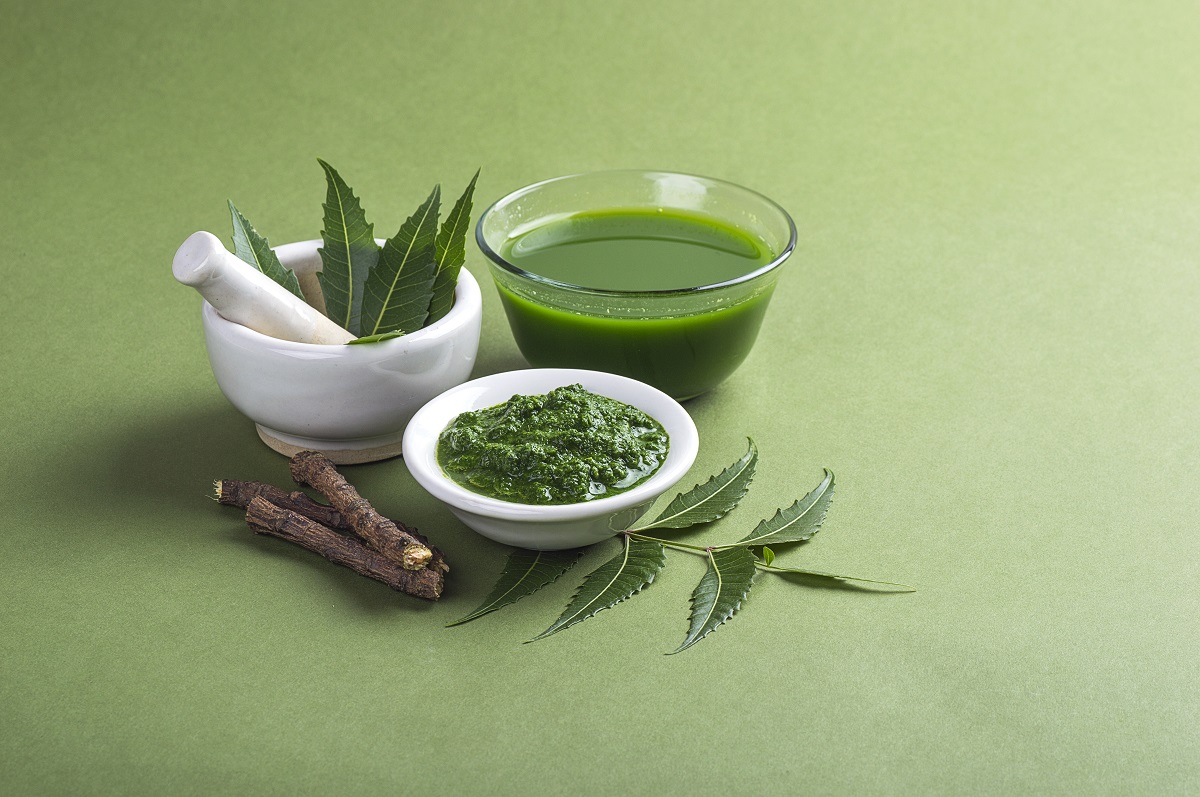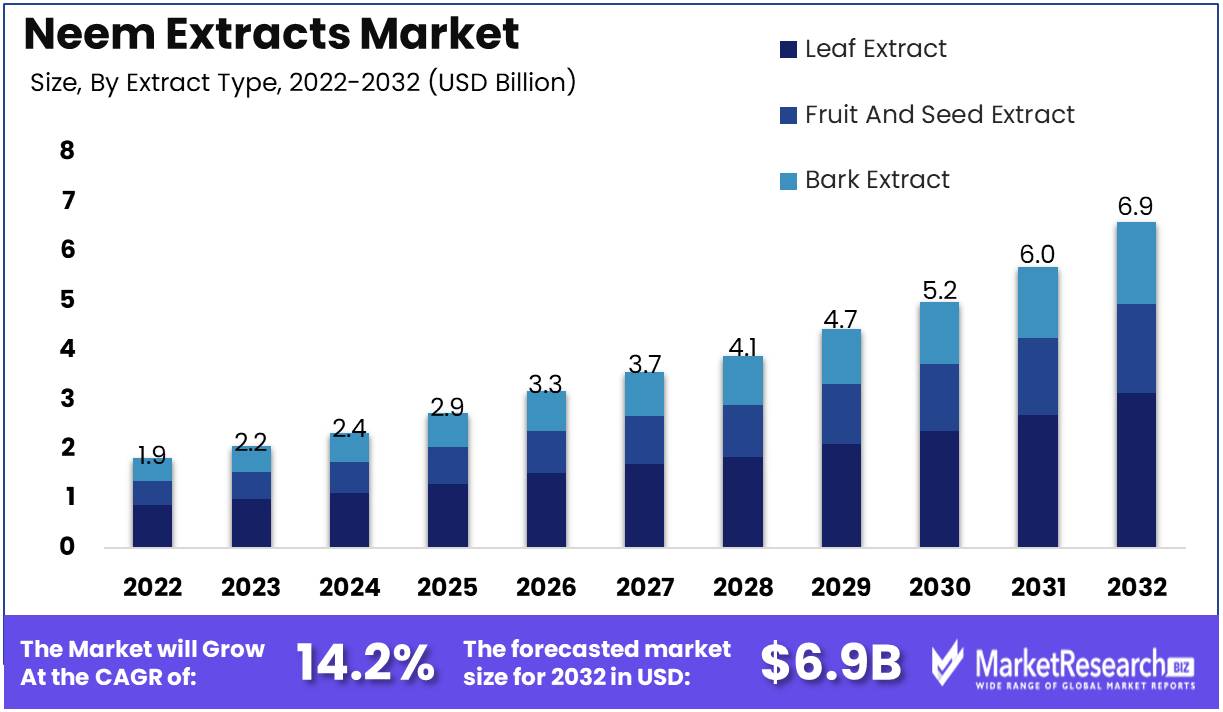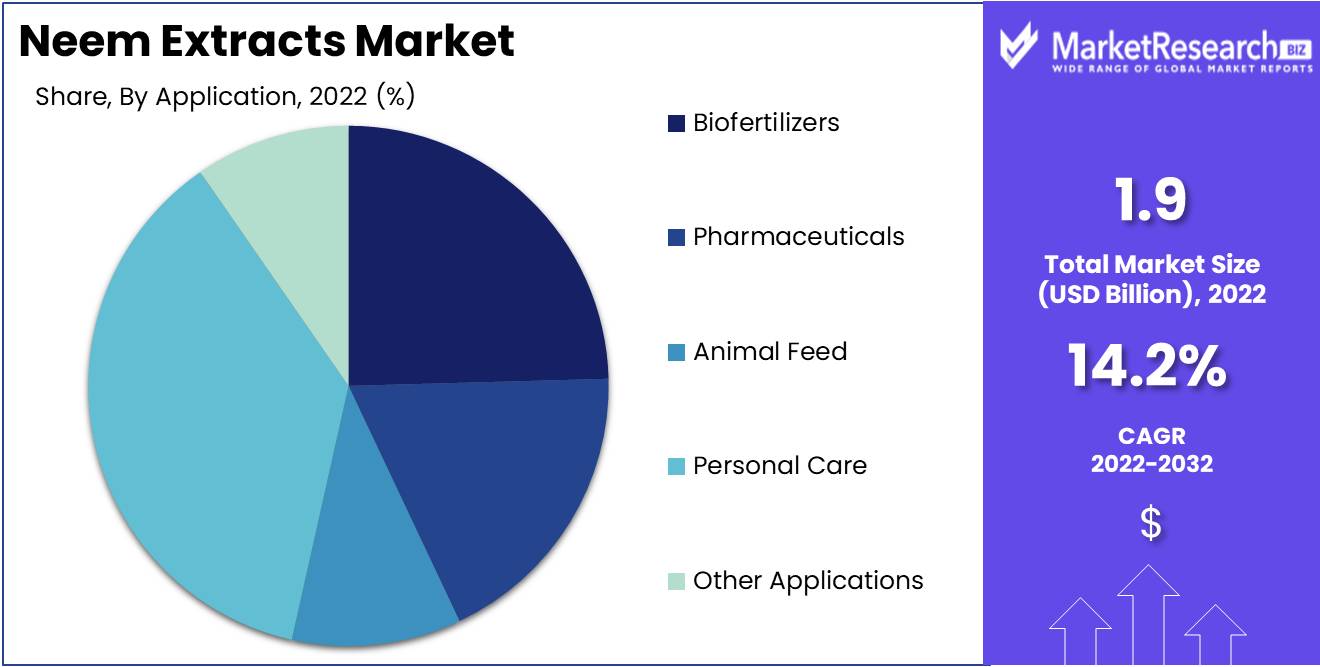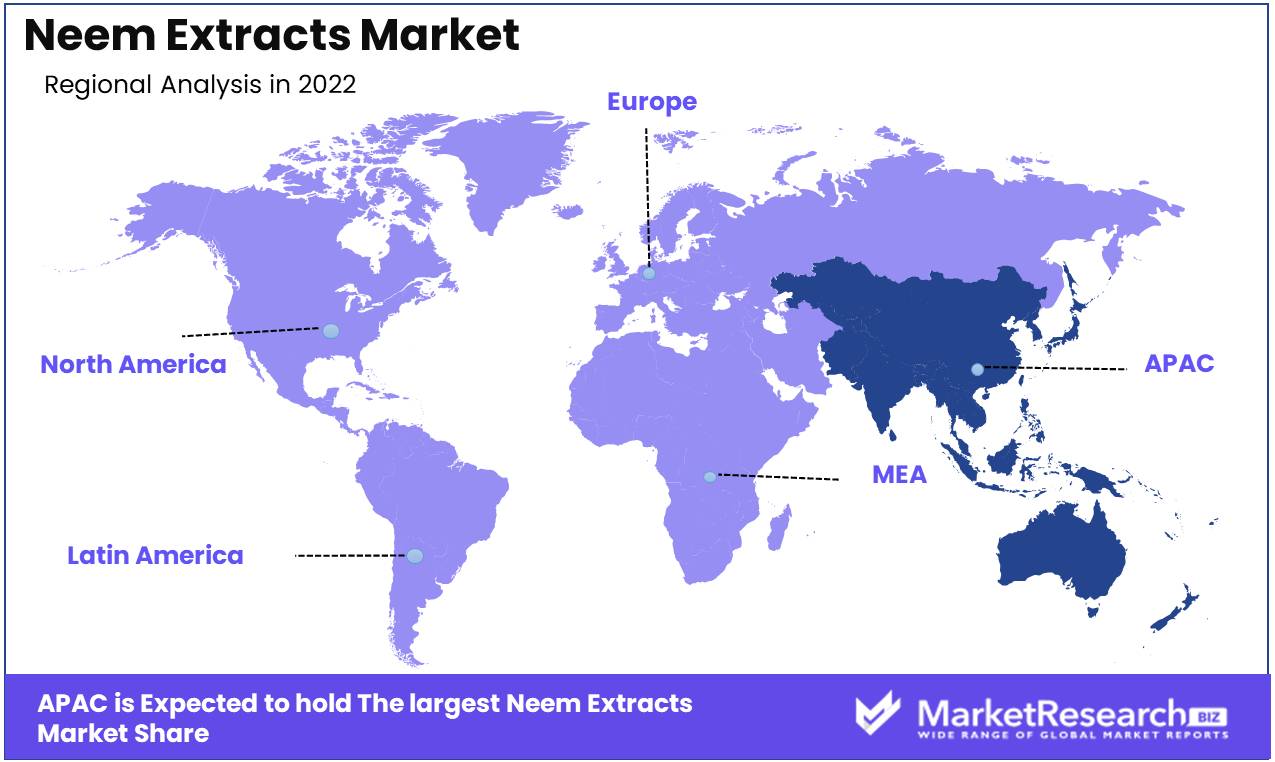
Neem Extracts Market By Extract Type (Leaf Extract, Fruit And Seed Extract, Bark Extract), By Application (Biofertilizers, Pharmaceuticals, Animal Feed, Personal Care, Other Applications), By Region And Companies - Industry Segment Outlook, Market Assessment, Competition Scenario, Trends, And Forecast 2023-2032
-
39978
-
July 2023
-
176
-
-
This report was compiled by Shreyas Rokade Shreyas Rokade is a seasoned Research Analyst with CMFE, bringing extensive expertise in market research and consulting, with a strong background in Chemical Engineering. Correspondence Team Lead-CMFE Linkedin | Detailed Market research Methodology Our methodology involves a mix of primary research, including interviews with leading mental health experts, and secondary research from reputable medical journals and databases. View Detailed Methodology Page
-
Quick Navigation
Report Overview
The Neem Extracts Market size is expected to be worth around USD 6.9 Bn by 2032 from USD 1.9 Bn in 2022, growing at a CAGR of 14.2% during the forecast period from 2023 to 2032.
Neem extracts, derived from the neem tree, have gained significant popularity in recent years due to their wide range of applications and numerous health benefits. The market for neem extracts is witnessing rapid growth, driven by increasing consumer demand and noteworthy innovations. The neem extracts market can be defined as the industry involved in the extraction and processing of compounds from the neem tree. The neem tree (scientifically known as Azadirachta indica) is native to the Indian subcontinent and has been widely recognized for its medicinal properties for centuries. The extracts are obtained from various parts of the tree, including leaves, bark, seeds, and oil. These extracts contain bioactive compounds such as Nimbin, azadirachtin, nimbidin, and nimbolide, which have proven to be beneficial for human health and possess effective insecticidal properties.

The importance and advantages of neem extracts cannot be underestimated. These extracts have gained recognition for their wide-ranging benefits in diverse industries. In agriculture, neem extracts are utilized as potent and safe insecticides, fungicides, and nematicides. They are effective against a wide range of pests and have minimal harmful effects on beneficial insects and non-target organisms. Thus, neem extracts allow farmers to combat pests while minimizing environmental damage.
Major investments and the incorporation of neem extracts into products and services have accelerated the growth of this market. International and domestic companies are recognizing the potential of neem extracts and investing in research, production, and marketing activities. Neem-based products are finding their way into cosmetics, skincare, haircare, and oral care products due to their natural and safe properties. The growing demand for organic and natural products has further fueled the incorporation of neem extracts into a wide range of consumer goods.
Various industries are investing in the neem extracts market for diverse reasons. In agriculture, the adoption of neem-based products helps farmers reduce their reliance on synthetic pesticides and promotes sustainable farming practices. Similarly, pharmaceutical companies are incorporating neem extracts into their product portfolio to develop drugs with enhanced efficacy and minimal side effects. The cosmetics and personal care industry values neem extracts for their skin-friendly and non-toxic properties, offering consumers natural alternatives to potentially harmful synthetic ingredients.
While the neem extracts market has tremendous potential for growth and innovation, it is essential to address ethical concerns and ensure responsible practices. Transparency, explainability, and accountability should be at the forefront of this industry to build trust among consumers and stakeholders. Companies must provide clear information about the sourcing, processing, and composition of neem extracts to maintain ethical standards. Additionally, authorities and industry bodies should enforce regulations and standards to prevent the misuse and misrepresentation of neem-based products.
Driving Factors
Growing Demand for Natural and Organic Products
The global movement towards sustainability and environmental consciousness has led to a surge in demand for natural and organic products, particularly in the personal care and cosmetics industry. Neem extracts, with their numerous medicinal properties derived from the neem tree, have experienced significant growth to meet this demand.
Expansion of the Personal Care and Cosmetics Industry
The personal care and cosmetics industry has seen a significant transformation with a growing preference for natural and plant-based alternatives due to consumer awareness of harmful chemical effects. This has led to the expansion and diversification of the neem extracts market, as they offer various skincare and haircare benefits with their antimicrobial, anti-inflammatory, and antifungal properties. Neem extracts are now widely used in formulating healthier and more sustainable beauty products.
Increasing Awareness of Neem's Medicinal and Therapeutic Properties
The ethylene glycol market remains constant. Neem's traditional use in Ayurvedic medicine for centuries and its therapeutic potential, backed by scientific research, have boosted awareness, leading to the expansion of the neem extracts market. Studies have highlighted neem's antimicrobial, anti-inflammatory, and immunomodulatory properties, making it popular for addressing various health issues, resulting in the growth of the neem extracts market in dietary supplements, herbal formulations, and natural remedies.
Rise of Sustainable and Eco-Friendly Agricultural Practices
The global shift towards sustainable agriculture has boosted the neem extracts market. Renowned for its natural insecticidal properties, neem acts as an effective biopesticide, offering farmers eco-friendly solutions for pest control and plant protection. The rise of sustainable farming practices further drives the adoption of neem-based products, promoting environmentally friendly agricultural methods.
Availability of Diverse Neem-Based Products in the Neem Extracts Market
The neem extracts market has expanded its product range significantly, offering various neem-based products for skincare, personal care, agriculture, and dietary supplements. Consumers now have diverse choices, including oils, powders, capsules, and liquid extracts, catering to their individual needs and preferences.
Restraining Factors
Potential Variability in Neem Extract Quality and Potency
The neem extracts market has grown significantly due to the demand for natural products in various industries like agriculture, personal care, and healthcare. However, a major restraint is the variability in neem extract quality and potency caused by different growth conditions. To address this, manufacturers must implement strict quality control measures, including selecting neem trees from specific regions, standardized farming practices, and regular testing. Investing in research and development for improved extraction techniques and formulations can further overcome these challenges.
Potential Regulatory and Compliance Challenges
The neem extracts market faces regulatory challenges due to increasing demand. Stricter guidelines are being implemented to ensure product safety and proper labeling. To tackle this, manufacturers should stay updated with regulations, seek certifications, and collaborate with regulatory consultants for effective compliance navigation.
Competition from Other Herbal and Plant Extracts
In a competitive market, neem extract manufacturers can stand out by developing innovative formulations with other plant-based ingredients, creating synergistic effects and enhancing product efficacy. Investing in research for new applications of neem extracts will expand market share and attract customers seeking specific solutions.
Potential Supply Chain and Sustainability Issues
Maintaining a reliable and sustainable supply chain in the neem extracts market is crucial due to the time-consuming nature of neem tree maturation and viable seed production. To address these challenges, neem extract manufacturers should establish long-term partnerships with farmers, promote sustainable agriculture, and invest in research for alternative sources and extraction methods to foster sustainability.
Limited Awareness and Understanding of Neem Products in the Neem Extracts Market
Limited awareness and understanding of neem extracts among consumers and industry professionals hinder their widespread adoption. To address this, neem extract manufacturers should educate target audiences through content marketing, industry events, collaborations with experts, and social media engagement to establish a stronger market presence.
Extract Type Analysis
The neem extracts market is thriving, with the leaf extract segment leading the way due to its rich nutrients and diverse applications in traditional medicine, supported by compounds with anti-inflammatory, anti-bacterial, and anti-fungal properties.
The Ethylene Glycol Market remains steady amid the increasing demand for organic and natural products, driving growth in the leaf extract segment. Consumers' growing concern about synthetic chemicals leads to a preference for safer alternatives like neem leaf extract in pharmaceuticals, dietary supplements, and personal care products. Economic development in emerging economies such as India, China, and Brazil also contributes to the segment's expansion, as rising disposable income and improved living standards boost demand for natural and organic products.
Moreover, consumer trends and behavior play a crucial role in the growth of the leaf extract segment. Consumers are becoming more health-conscious and are actively seeking products that offer multiple benefits. Neem leaf extract, with its wide range of applications, aligns with these consumer preferences. It is used in skincare products, hair care formulations, oral health products, and even in the agricultural sector as a natural pesticide.
Application Analysis
Among the various applications of neem extracts, the personal care segment has emerged as the dominant market leader. The personal care industry encompasses skincare, hair care, oral care, and hygiene products. Neem extracts are being increasingly used in the production of personal care products due to their numerous benefits.
Neem extracts are increasingly popular in the personal care industry due to their antimicrobial, antifungal, and nourishing properties. They combat acne-causing bacteria, reduce inflammation, moisturize dry skin, and promote hair growth while preventing dandruff and scalp infections.
Economic development in emerging economies has driven the adoption of neem extracts in the personal care segment. Rising disposable income and demand for natural products have fueled its growth. Consumer consciousness about ingredients and preference for natural alternatives have also contributed to neem extracts' dominance in personal care.

Key Market Segments
By Extract Type
- Leaf Extract
- Fruit And Seed Extract
- Bark Extract
By Application
- Biofertilizers
- Pharmaceuticals
- Animal Feed
- Personal Care
- Other Applications
Growth Opportunity
Harnessing the Power of E-commerce Platforms
In this digital age, businesses can leverage the power of online platforms to tap into a wider target audience and increase market reach. A strong online presence, including an informative and user-friendly website, optimized product listings, and engaging social media profiles, can significantly boost visibility and attract potential customers. Leveraging e-commerce platforms can provide a seamless and convenient way for consumers worldwide to access high-quality neem extract products and make purchases, further expanding market opportunities.
Forming Strategic Partnerships with Research Institutions and Universities
Collaboration with manufacturers and formulators has already been mentioned as a growth opportunity in the neem extracts market. However, another avenue for growth lies in forming strategic partnerships with research institutions and universities specializing in relevant fields. By joining forces with academia, businesses can unlock new frontiers in neem-based application research and development. This collaboration can lead to the discovery of novel uses for neem extracts, such as in the pharmaceutical, cosmetic, and agriculture industries. Such partnerships can also help attract funding for research projects and provide valuable insights into market trends and consumer demands.
Enhancing Product Diversification and Innovation
While standardized neem extracts have already gained popularity in various industries, there is still room for product diversification and innovation. Businesses can focus on expanding their product portfolio by developing new formulations and delivery systems that cater to specific consumer needs. For instance, exploring the potential of neem extracts in the form of capsules, serums, or bio-based packaging materials can open up new market segments and create a competitive edge. Furthermore, conducting extensive research and development to unlock the full potential of neem extracts in addressing modern health and environmental challenges, such as antimicrobial resistance and sustainability, can position businesses as pioneers in the industry.
Latest Trends
Neem-Based Personal Care and Cosmetic Products
The beauty and personal care industry has experienced a notable shift, as consumers have demonstrated a pronounced inclination towards natural and organic alternatives when it comes to their skincare and cosmetic merchandise. Neem extracts, renowned for their antibacterial, antifungal, and anti-inflammatory attributes, have gained significant traction as a favored option among these environmentally aware individuals. Consequently, there has been a consistent expansion in the market for personal care and cosmetic products derived from neem, owing to the increasing consumer preference for organic and environmentally-friendly beauty remedies.
Increasing Demand for Neem Extracts in Natural Pesticides and Insect Repellents
The mounting concerns about the harmful effects of synthetic pesticides and insecticides on both human health and the environment have led to a notable shift towards eco-friendly and organic options. Neem extracts, with their powerful insecticidal properties, have become a viable and sought-after solution for pest control. Consequently, there has been a surge in the demand for neem-based natural pesticides and insect repellents as farmers and consumers alike seek safer and more sustainable pest management methods.
Neem Extracts in Oral Care and Healthcare Products
Neem extracts have earned a longstanding reputation for their oral health benefits, which include preventing gum disease, reducing plaque, and eliminating bacteria causing bad breath. As consumers increasingly prioritize holistic healthcare approaches, oral care products containing neem extracts have gained significant traction in the market. The antibacterial and antifungal properties of neem make it an excellent ingredient for mouthwashes, toothpaste, and other dental products.
Neem Extracts in Traditional and Alternative Medicine
Neem has been a fundamental component of traditional medicine systems like Ayurveda for centuries. The medicinal properties of neem extracts, including their anti-inflammatory, antiviral, and immune-boosting effects, have garnered recognition in the field of alternative medicine. As consumers seek out natural remedies and holistic healthcare approaches, neem extracts are increasingly finding their way into a wide range of herbal supplements, tinctures, and other natural remedies, contributing to the growth of the alternative medicine market.
Regional Analysis
Asia-Pacific Region Dominates the Neem Extracts Market, Neem, a versatile and highly valued tree, has long been recognized for its numerous health benefits and extensive applications in various industries. Extracts derived from neem have gained significant attention in recent years due to their natural and sustainable properties. As the global demand for neem extracts continues to rise, it is worth noting that the Asia-Pacific region has emerged as the dominant player in the market.
The Asia-Pacific region dominates the neem extracts market due to its rich biodiversity and favorable climate. India, China, and Indonesia are major producers, focusing on sustainable sourcing and production. China's policies support neem industry development, while Indonesia's abundant resources and advanced extraction techniques attract investments. The region's vast neem plantations and skilled labor, along with rising global demand for eco-friendly agricultural solutions, contribute to its market dominance.
India, in particular, stands out as a key contributor to the Asia-Pacific neem extracts market. The country has a long history of utilizing neem for various purposes, including medicine, agriculture, and personal care. With favorable government policies and increasing investments in research and development, India has established itself as a prominent producer and exporter of neem extracts. The country's vast neem plantations coupled with advanced extraction techniques have positioned it as a major supplier to both domestic and international markets.
The Asia-Pacific region's rich tradition of using neem for medicinal and agricultural purposes has made it a prominent center for neem-based research and development. This has resulted in innovative applications and formulations of neem extracts. The market demand for neem extracts in the region has surged, especially in pharmaceuticals for their healing properties and minimal side effects, and in the personal care industry for skincare and haircare products, driven by the growing consumer preference for natural and sustainable options.
The Asia-Pacific region has emerged as the dominant force in the neem extracts market. With countries such as India, China, and Indonesia leading the way, the region benefits from rich biodiversity, advanced extraction technologies, and a strong tradition of utilizing neem for various purposes. As the global demand for sustainable and natural ingredients continues to rise, the Asia-Pacific region's dominance in the neem extracts market is likely to persist and expand further, driving innovation and growth in the industry.

Key Regions and Countries
North America
- US
- Canada
- Mexico
Western Europe
- Germany
- France
- The UK
- Spain
- Italy
- Portugal
- Ireland
- Austria
- Switzerland
- Benelux
- Nordic
- Rest of Western Europe
Eastern Europe
- Russia
- Poland
- The Czech Republic
- Greece
- Rest of Eastern Europe
APAC
- China
- Japan
- South Korea
- India
- Australia & New Zealand
- Indonesia
- Malaysia
- Philippines
- Singapore
- Thailand
- Vietnam
- Rest of APAC
Latin America
- Brazil
- Colombia
- Chile
- Argentina
- Costa Rica
- Rest of Latin America
Middle East & Africa
- Algeria
- Egypt
- Israel
- Kuwait
- Nigeria
- Saudi Arabia
- South Africa
- Turkey
- United Arab Emirates
- Rest of MEA
Key Players Analysis
Symrise, a German company, excels in the production of neem-based fragrances. They skillfully combine traditional fragrance expertise with the properties of neem extracts to create captivating scents. By leveraging their extensive knowledge and cutting-edge technology, Symrise has carved a niche for itself in the fragrance industry. Their neem-infused fragrances reflect a harmonious blend of nature and innovation.
Kangcare, a Chinese company, has emerged as a dominant player in neem extract manufacturing. With state-of-the-art facilities and advanced extraction techniques, Kangcare ensures the production of premium quality neem extracts. Their commitment to strict quality control measures has garnered trust and recognition from the market. Kangcare's continuous research and development efforts have led to the introduction of innovative neem extract solutions, catering to the evolving industry needs.
P.T. Haldin Pacific Semesta, a company based in the United States, has diversified the utilization of neem extracts in multiple sectors. Through the provision of a diverse array of neem-based products, they effectively address the varied requirements of their clientele. The persistent endeavors of P.T. Haldin Pacific Semesta in the areas of product development and market research have been instrumental in driving their expansion and establishing their prominence as a significant participant in the neem extracts industry.
Givaudan, a prominent Swiss corporation, has positioned itself as a significant participant in the neem extracts industry. Givaudan has effectively cultivated inventive neem-based formulations, placing significant emphasis on research and development. The company's dedication to sustainability and adoption of environmentally conscious practices has significantly contributed to its expansion within the market. Givaudan provides a diverse selection of neem extracts that exhibit versatility and efficacy, thereby meeting the varied requirements of multiple industries.
Top Key Players in Neem Extracts Market
- Givaudan (Switzerland)
- Sensient Technologies Corporation (U.S.)
- Symrise (Germany)
- Kangcare (China)
- P.T. INDESSO AROMA (Indonesia)
- P.T. Haldin Pacific Semesta. (U.S.)
- VidyaHerbs (India)
- Tokiwa Phytochemical Co. Ltd. (Japan)
- NATIVE EXTRACTS Pty Ltd. (Australia)
- Shaanxi Jiahe Phytochem Co.Ltd. (China)
- Synthite Industries Ltd. (India)
- Döhler
- International Flavors & Fragrances Inc. (Germany)
- Martin Bauer Group (Germany)
- Arjuna Natural Pvt Ltd (India)
- Organic Herb Inc. (China)
- Plant Extracts International Inc (U.S.)
Recent Development
- In 2023, The Neem Tree Research & Development Foundation, a leading institution in neem research and innovation, has recently made a significant announcement regarding a pioneering advancement in the field. The foundation is poised to introduce a distinctive assortment of neem extracts that have been specifically tailored to meet the unique requirements of the pharmaceutical sector. Neem, due to its wide range of therapeutic properties, is positioned to assume a substantial role in the development of pharmaceutical formulations, presenting considerable potential for advancements in the field of medicine.
- In 2022, Another noteworthy development took place when A. Vogel, renowned for its commitment to natural herbal remedies, announced its plans to bolster the production capacity for neem extracts. Expanding its operations in Switzerland, A. Vogel aims to meet the growing market demand by ensuring a steady supply of high-quality neem extracts. This move signifies the company's dedication to delivering sustainable and effective natural healthcare solutions globally.
- In 2021, One recent alliance that has grabbed industry attention is the strategic partnership between Himalaya Herbal Healthcare and Walmart. The renowned herbal healthcare company joined forces with the global retail giant to expand the distribution of its neem extracts in stores across the United States. This collaboration is expected to make Himalaya Herbal Healthcare's products more easily accessible to consumers seeking natural remedies, boosting the overall growth of the neem extracts market.
Report Scope
Report Features Description Market Value (2022) USD 1.9 Bn Forecast Revenue (2032) USD 6.9 Bn CAGR (2023-2032) 14.2% Base Year for Estimation 2022 Historic Period 2016-2022 Forecast Period 2023-2032 Report Coverage Revenue Forecast, Market Dynamics, COVID-19 Impact, Competitive Landscape, Recent Developments Segments Covered By Extract Type (Leaf Extract, Fruit And Seed Extract, Bark Extract)
By Application (Biofertilizers, Pharmaceuticals, Animal Feed, Personal Care, Other Applications)Regional Analysis North America – The US, Canada, & Mexico; Western Europe – Germany, France, The UK, Spain, Italy, Portugal, Ireland, Austria, Switzerland, Benelux, Nordic, & Rest of Western Europe; Eastern Europe – Russia, Poland, The Czech Republic, Greece, & Rest of Eastern Europe; APAC – China, Japan, South Korea, India, Australia & New Zealand, Indonesia, Malaysia, Philippines, Singapore, Thailand, Vietnam, & Rest of APAC; Latin America – Brazil, Colombia, Chile, Argentina, Costa Rica, & Rest of Latin America; Middle East & Africa – Algeria, Egypt, Israel, Kuwait, Nigeria, Saudi Arabia, South Africa, Turkey, United Arab Emirates, & Rest of MEA Competitive Landscape Givaudan (Switzerland), Sensient Technologies Corporation (U.S.), Symrise (Germany), Kangcare (China), P.T. INDESSO AROMA (Indonesia), P.T. Haldin Pacific Semesta. (U.S.), VidyaHerbs (India), Tokiwa Phytochemical Co. Ltd. (Japan), NATIVE EXTRACTS Pty Ltd. (Australia), Shaanxi Jiahe Phytochem Co.Ltd. (China), Synthite Industries Ltd. (India), Döhler, International Flavors & Fragrances Inc. (Germany), Martin Bauer Group (Germany), Arjuna Natural Pvt Ltd (India), Organic Herb Inc. (China), Plant Extracts International Inc (U.S.) Customization Scope Customization for segments, region/country-level will be provided. Moreover, additional customization can be done based on the requirements. Purchase Options We have three licenses to opt for: Single User License, Multi-User License (Up to 5 Users), Corporate Use License (Unlimited User and Printable PDF) -
-
- Givaudan (Switzerland)
- Sensient Technologies Corporation (U.S.)
- Symrise (Germany)
- Kangcare (China)
- P.T. INDESSO AROMA (Indonesia)
- P.T. Haldin Pacific Semesta. (U.S.)
- VidyaHerbs (India)
- Tokiwa Phytochemical Co. Ltd. (Japan)
- NATIVE EXTRACTS Pty Ltd. (Australia)
- Shaanxi Jiahe Phytochem Co.Ltd. (China)
- Synthite Industries Ltd. (India)
- Döhler
- International Flavors & Fragrances Inc. (Germany)
- Martin Bauer Group (Germany)
- Arjuna Natural Pvt Ltd (India)
- Organic Herb Inc. (China)
- Plant Extracts International Inc (U.S.)




